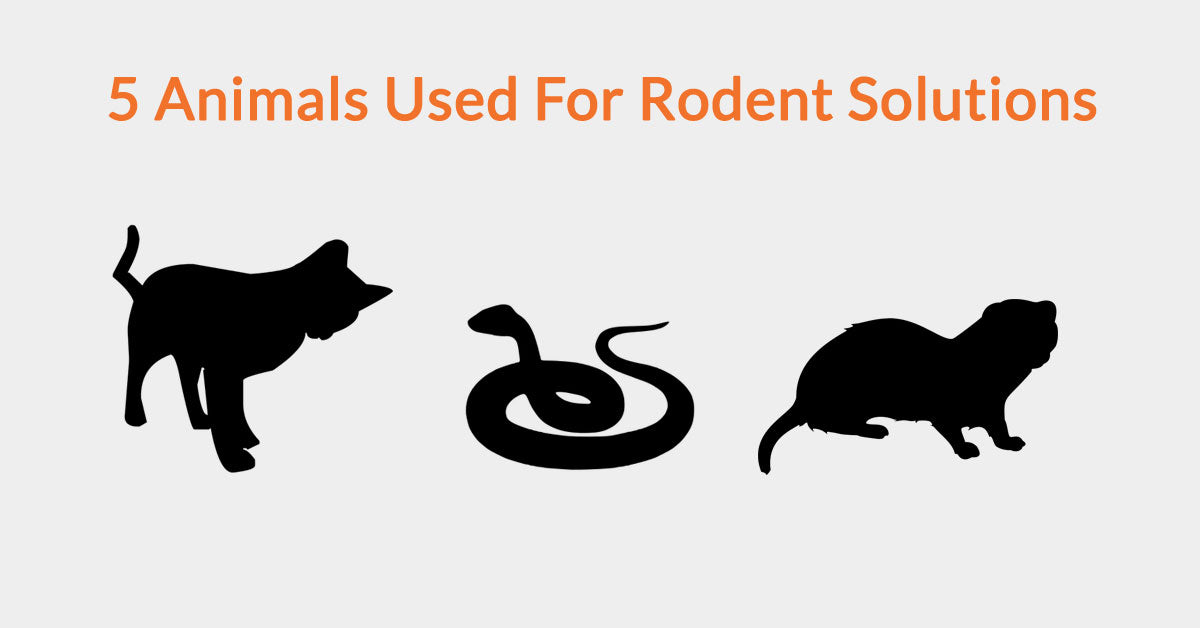
5 Animals Used For Rodent Solutions

Humans and rodents have lived in relatively close quarters for centuries. On occasion, as they do today, the rats or mice would get a little too close for comfort, and the humans would have to take steps to reclaim their space.
Before snap or glue traps, rat poison, or high-tech self-resetting traps existed, people relied on other animals to keep rodents at bay. While this solution isn’t very practical for our modern world, we do sometimes get questions from homeowners about whether they should use their pets to solve their rat or mouse problem.
Let’s take a look at five animals that are most often used for rodent solutions—and whether or not they are your best bet.
1. Cats
Of course, the No. 1 enemy of any rodent is supposed to be the house cat. But their reputation as great rat hunters is a bit misplaced. In fact, most domesticated cats don’t want much to do with mice and rats. They might chase and toy with one until it gets away or dies, but unlike their wild feline cousins, they’re not really driven by an instinct to hunt and kill them.
That’s just one reason why a cat isn’t always the best solution for a rodent problem. To make matters worse, your cat can become ill from toying with a dying rat or mouse. And if the rodent fights back, it could injure your pet.
Plus, if you don’t currently have a cat, getting one might actually increase your chances of attracting rodents. That’s because having cat food around your home is a surefire way to get the attention of area rats and mice.
2. Certain Breeds of Dogs
Many homeowners are surprised to learn that certain breeds of dogs were actually bred to catch rats. This is especially true of terriers, who are fast, full of energy, and skilled at digging holes to chase down rodents. They were even bred to have short, thick tails so their owners could easily pull them out of a deep burrow if they got stuck. In addition to terriers, dachshunds and German pinschers are also well known for being great ratters.
However, the same words of caution about cats apply to dogs. In our modern households, dogs are pets, not workers, and relying on them to take care of a rodent problem isn’t exactly safe. Again, if you already have a dog, be sure to keep your dog food safely stowed away; otherwise, you’ll simply be inviting more rodents to come visit.
3. Snakes
Snakes are excellent rodent hunters and, indeed, many pet snakes enjoy frozen mice for dinner. However, setting a snake loose in your home in an attempt to catch rodents could be problematic, both for the snake and for your family. Plus, the pet could be injured by a mouse or rat that decides to fight back.
4. Weasels and Ferrets
These slinky, cuddly pets are also ruthless rodent killers, thanks to their quick speed and ability to fit into tiny spaces. However, just like the critters above, they can easily be injured in a rodent chase. They should be fed pre-killed mice or rats for their own safety.
5. Humans, in Some Cultures
While you likely don’t want to take care of a household rodent problem in this way, some cultures do keep their rat populations down by incorporating the critters into their diets. It’s a reasonable approach for people who need reliable, affordable access to meat.
For example, in certain Indian and Polynesian cultures, rat meat is a part of traditional cuisine. Rat meat can serve as a good protein source—but we understand if you’re not in a rush to try it.
A Reliable Alternative
Considering the limitations of the animals above—and the grossness of the thought of eating a household rodent—you’re probably better off going with a rat trap that will quickly and take care of your problem.
The Goodnature™ A24 Rat and Mouse Trap instantly kills each rodent the moment it approaches the trap, then resets itself, without interference from you. As a result, you get to enjoy a solution to your rodent problem—all without endangering the family pet.
- Choosing a selection results in a full page refresh.
!

